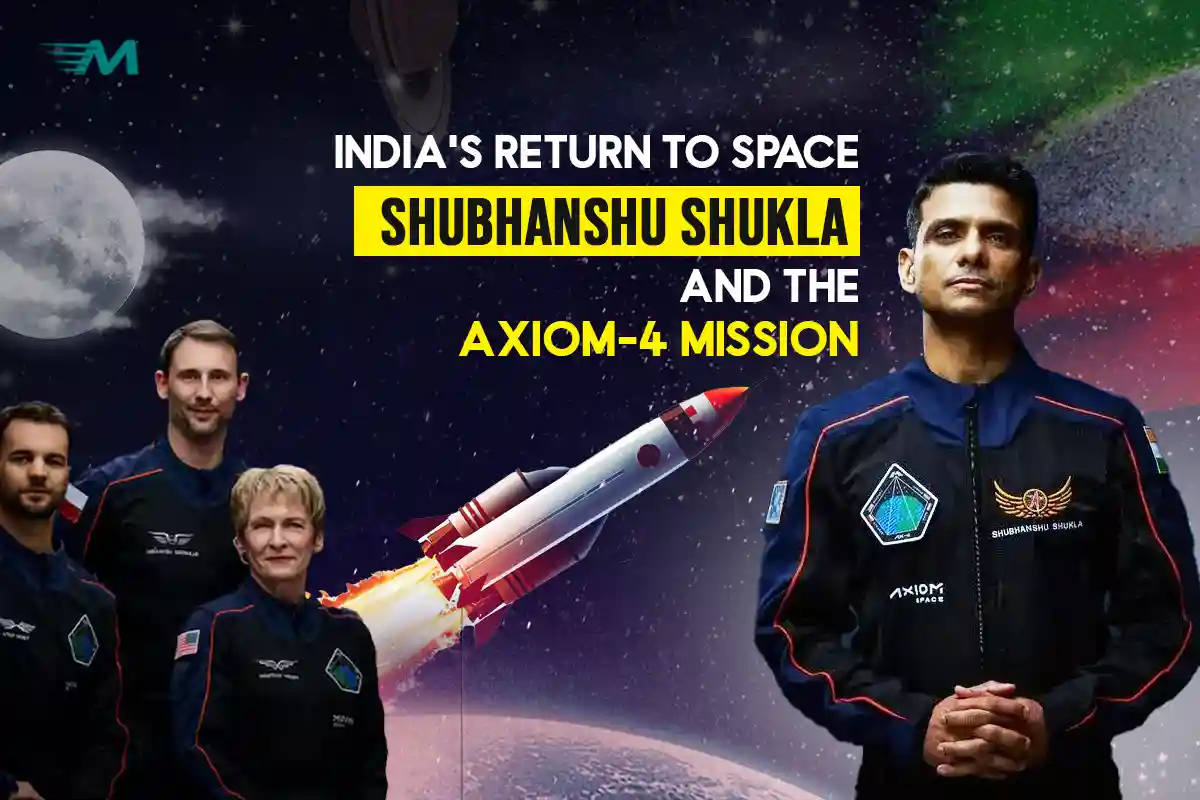India’s Return to Space: The Story of Shubhanshu Shukla and the Axiom-4 Mission
In the vast silence of space, a familiar voice echoed back to Earth:
With these powerful words, Group Captain Shubhanshu Shukla marked a historic moment not just for himself, but for 1.4 billion Indians. After more than four decades since Rakesh Sharma’s pioneering spaceflight, India returned to human space exploration with the groundbreaking Axiom-4 Mission. But this time, the story had a new face, a new direction, and a fresh dream.
A Dream Born in Lucknow
Shubhanshu Shukla was not born into privilege or surrounded by rockets and laboratories. He was born in Lucknow in 1985, a year after Rakesh Sharma made history. As a child, his dream took root not in a science lab, but during an air show that exposed him to the raw power of flight.
That moment stayed with him, and like all great journeys, it quietly shaped his destiny. Years later, that childhood dream would align with India’s ambitions through the Axiom-4 Mission, where Shukla would etch his name in space history.
He studied at City Montessori School (CMS) and was recognized not only for his academic excellence but also for his intense focus. His entry into the National Defence Academy (NDA) was serendipitous — a form filled at the last moment, a friend’s suggestion, and a leap of faith.
Fast forward to 2025, and the boy from Lucknow is now the first Indian astronaut to reach the International Space Station (ISS) aboard the Axiom-4 mission.
Axiom-4: More Than a Mission
Launched on June 25, 2025, the Axiom-4 mission was a joint effort between Axiom Space, NASA, and ISRO, marking a pivotal moment for India’s space program. The spacecraft, Dragon “Grace”, lifted off from Florida’s Kennedy Space Centre, carrying Shukla and three other astronauts: veteran commander Peggy Whitson, Hungary’s Tibor Kapu, and Poland’s Slawosz Uznanski-Wisniewski.
In just ten minutes post-launch, the crew was orbiting Earth at a speed of 7.5 km/sec. The pride in Shukla’s voice as he spoke in Hindi from orbit resonated deeply across India.
The tricolour on my shoulder tells me I’m not alone. I’m carrying India with me.
It wasn’t just about science or technology; it was about identity, aspiration, and national pride.
What Happens in Space Isn’t Just Science Fiction
Shukla’s 14-day stay on the ISS isn’t a tourist trip. It’s packed with scientific goals that reflect India’s growing space ambitions. In collaboration with ISRO and the Department of Biotechnology, Shukla is conducting a series of experiments related to food, health, and human performance in microgravity.
One standout project includes sprouting methi and moong seeds in space — a first-of-its-kind initiative to study nutrition in extraterrestrial environments. The research also ties in with space-based solutions for sustainable agriculture and food processing back on Earth.
Interestingly, Shukla also carried with him two classic Indian desserts: gajar ka halwa and moong dal halwa, not just to relish but to share, adding a cultural flavor to the scientific journey.
More Than a Pilot, A Symbol of Focus
With over 2,000 flying hours on aircraft such as the Su-30 MKI, MiG-29, and Jaguar, Shukla has demonstrated relentless discipline. He holds a Master’s degree in Aerospace Engineering from IISc Bangalore, one of India’s top institutions. Those who know him describe him as “wicked smart,” “operationally sharp,” and remarkably calm under pressure.
His journey through the ISRO-NASA training pipeline, including time at Russia’s Gagarin Cosmonaut Training Centre, demonstrates not only technical proficiency but emotional resilience.
More Than an Individual Mission
This is not just Shukla’s moment. It’s India’s space reset button. After years of working on satellites, Mars missions, and Moon landings, India is finally placing humans back in space. The mission also sets the stage for the Gaganyaan project, India’s own indigenous human spaceflight program expected to launch in 2027.
As Shukla himself said:
This is not just my journey to the ISS. It’s the beginning of India’s human spaceflight journey.
Final Thoughts:
What makes this story truly inspiring is how relatable it is. A child from a regular Indian family, curious about airplanes, ends up in space. The Axiom-4 Mission proves that with discipline, opportunity, and support, dreams do take flight sometimes literally.
From his school teachers to his six-year-old son, from his hometown Lucknow to people watching in Delhi and Chennai, the pride is collective.

